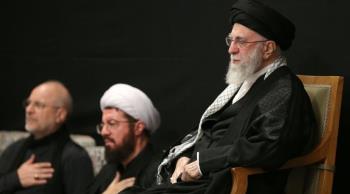Alwaght-Criminals involved in the grisly murder of Egyptian Shiite Muslims leader Hassan Shehata and three members of his community in June 2013 have been handed lenient sentences by the country's court.
During the Saturday ruling, Takfiri Salafist elements involved in the mob attack on a small Shia community were sentenced to only 14 years in prison, Ahram online reported. The gruesome lynching of the Egyptian Shite leader was videotaped sending shock waves across the country. Eight of the defendants originally charged with attempted murder were exonerated by the court.
The lenient sentences for those involved in the brutal murders were issued by the Cairo court while Egyptian judges handed down death sentences to activists involved in inciting rallies in protest at the military ouster of Egypt’s first democratically elected president Mohamed Morsi in July 2013.
In the horrific lynching on June 23, 2013, an angry mob led by the country’s Saudi-backed Salafist sheikhs torched Shia residences in the small village of Zawyat Abu Musalam in Giza governorate, killing four citizens, including Shehata, a prominent cleric who was visiting one of the families in the village when the attack took place.
Extended video footage circulated online showing one of the victims being beaten and dragged through the streets. Eyewitness accounts say several members of the Shiite community were stabbed multiple times in a brutal incident of public lynching.
The Shiite scholar was born in November 10, 1946 in the small town of Harbit, Markaz Abu Kabir, in al-Sharqiyah province of Egypt.
He served as a prominent cleric who had thousands of followers due to his moderate views and his denouncement of radical and extremist movements in Egypt.
He was well known for telling people about the nature of extremist groups and radical thoughts which are common in Egypt due to the powerful presence of radical Salafist groups.
In Egypt, the small Shiite population is harassed by authorities and treated with suspicion, being arrested - ostensibly for security reasons - but then being subjected to torrents of abuse by state security officers for their religious beliefs.
The Arab country has been witnessing a rise in hate crimes against Shiite Muslims, which observers believe is due to the widespread anti-Shiite propaganda by Wahhabi elements aimed at encouraging people to go fight alongside the foreign-backed Takfiri terrorists in Syria.
- Ayatollah Khamenei Presides Over the Ashura Night Mourning Ceremony in Tehran
- New Roadmap for Lebanon Betrays Next American-Israeli Moves
- Syria-Israel Normalization Pending between Al-Sharaa’s Willingness and Netanyahu’s Worry
- Iraq, the Strategic Middle Ground During Israeli-Iranian War
- Iran’s President Orders a Halt to Cooperation with The IAEA Over Political Issues
- The US Greenlights A $510 Million Arms Sale to Israel Amid Gaza Genocide
- German Media Allegations Rejected by Iran’s Embassy in Berlin
- Araghchi Stated That the Damage to Fordow Was Extensive
- Al-Sharaa Reportedly Held Private Talks with Israeli Officials on UAE Soil
- With Fresh Israeli War on Iran Looking Highly Likely, Can Tel Aviv Withstand a New Heavy Blow?
Editor's Choice

New Roadmap for Lebanon Betrays Next American-Israeli Moves The US sets a deadline for the Lebanese government to disarm Hezbollah, or Israel will keep occupying parts of southern Lebanon.
Netanyahu Striving to Drag US into War The Israeli regime is escalating its aggression against Iran to pave the way for American involvement in war.
What Factors Are Eroding Israeli Resilience in War with Iran? Israel is grappling with home crisis and costs of war and international opposition to its aggression on Iran can cost it dearly.
In Imam Khomeini’s Discourse, Palestinian Cause Is a Test of Right and Wrong Imam Khomeini of Iran raised the Palestinian cause as a criteria with which we can test who is the true advocate of human rights.
Can South Africa Apartheid Fall Offer Lessons to Check Israel? World unity against Israel can make a dramatic difference, but the Western support to Israeli crimes cannot be underestimated.
News

Ayatollah Khamenei Presides Over the Ashura Night Mourning Ceremony in Tehran
On Saturday, an Ashura night mourning ceremony was held at the Husseiniyeh of Imam Khomeini in Tehran, attended by the Leader of the Islamic RevolutionIran’s President Orders a Halt to Cooperation with The IAEA Over Political Issues Iran’s President Masoud Pezeshkian has officially approved legislation to halt cooperation with the IAEA
The US Greenlights A $510 Million Arms Sale to Israel Amid Gaza Genocide The US government has greenlit a $510 million arms sale to the Israeli regime, bolstering Washington’s military support
German Media Allegations Rejected by Iran’s Embassy in Berlin Recent claims by some German media about possible assaults on Jewish locations have been firmly rejected by the Iranian Embassy in Berlin
Araghchi Stated That the Damage to Fordow Was Extensive Precise information about what occurred at the Fordow nuclear site is not yet available. However, Araghchi believes the damage is significant
Al-Sharaa Reportedly Held Private Talks with Israeli Officials on UAE Soil The covert talks between Syrian President Ahmad al-Sharaa and Israeli intelligence reflect Damascus’ deliberate move away from the resistance bloc
Leader’s Aide Warns Israel and the US: ‘The Next Retaliation Will Surpass Your Expectations’ Iran’s next retaliatory strikes, should a new aggression occur, will be significantly more powerful than those during the recent 12-day Israeli conflict
Araghchi: Bombs Cannot Destroy Iran’s Uranium Enrichment Technology Iran’s expertise and resolve to develop its peaceful nuclear industry cannot be easily dismantled by military attacks
Gen. Vahidi: Iran’s Missile Capabilities Are in An Outstanding State Iran’s missile capability to counter the aggression of the criminal Zionist regime is in an excellent condition
Sheikh Qassem: Resistance Will Never Submit to The US And Israel The Hezbollah secretary general declares that the Lebanese resistance will never bow to the oppression of the United States and the occupying Israeli regime
Hamas Is Ready for Another Round of Indirect Gaza Ceasefire Talks with Israel A senior Hamas official states that the Palestinian resistance movement is prepared and committed to starting a new round of indirect talks with Israel
Foreign Minister Araghchi: Iran Firmly Supports a World Without Weapons of Mass Destruction The Islamic Republic of Iran has consistently championed the cause of a world free from weapons of mass destruction
German Chancellor Criticized for Anti-Iran Positions The spokesperson for the Iranian Foreign Ministry condemned Germany’s position on the Zionist regime’s recent aggression against Iran
Deputy Foreign Minister Rejects Reports of Iran-US Talks Planning An Iranian deputy foreign minister dismissed reports suggesting a new round of talks between Iran and the US is being planned
Ex-Parliament Speaker: Israel Failed to Assassinate Iran’s Leader and Top Government Officials Israel had planned to strike a high-level gathering of Iranian officials, including government heads, and subsequently assassinate the Leader
Iran Closely Monitors Israeli Actions Nearby Iran states it is closely watching any Israeli attempts to use neighboring countries’ territory for renewed aggression against the Islamic Republic
Iran Deployed Less Than 5% Of Its Defensive Capabilities Against Israel According to a top Iranian commander, Tehran utilized under five percent of its defensive strength in response to the Israeli regime’s recent unprovoked aggression
Parliament Speaker Criticizes Trump’s Rhetoric Against Iran Iranian Parliament Speaker Mohammad Baqer Qalibaf denounced the US president’s inconsistent positions and disrespectful rhetoric toward Iran
Iran Calls on UNSC to Designate US and Israel as Aggressors The Iranian foreign minister urged the UN Security Council to acknowledge the Israeli regime and the US as the perpetrators of the recent aggression against Iran
High-ranking General: Iran Is Skeptical About Israel’s Compliance with The Truce Iran’s Armed Forces Chief of Staff has expressed deep doubts about Israel honoring the US-declared unilateral ceasefire
Most Viewed
New Roadmap for Lebanon Betrays Next American-Israeli Moves
German Media Allegations Rejected by Iran’s Embassy in Berlin
With Fresh Israeli War on Iran Looking Highly Likely, Can Tel Aviv Withstand a New Heavy Blow?
Leader’s Aide Warns Israel and the US: ‘The Next Retaliation Will Surpass Your Expectations’
Araghchi: Bombs Cannot Destroy Iran’s Uranium Enrichment Technology
Al-Sharaa Reportedly Held Private Talks with Israeli Officials on UAE Soil
Iran’s President Orders a Halt to Cooperation with The IAEA Over Political Issues
Araghchi Stated That the Damage to Fordow Was Extensive
New Roadmap for Lebanon Betrays Next American-Israeli Moves
Hamas Is Ready for Another Round of Indirect Gaza Ceasefire Talks with Israel
Gen. Vahidi: Iran’s Missile Capabilities Are in An Outstanding State
Syria-Israel Normalization Pending between Al-Sharaa’s Willingness and Netanyahu’s Worry
Iraq, the Strategic Middle Ground During Israeli-Iranian War
How Does Arab Public Opinion Look at Israeli-Iranian War?
Ayatollah Khamenei Presides Over the Ashura Night Mourning Ceremony in Tehran
Sheikh Qassem: Resistance Will Never Submit to The US And Israel
Iran’s Military Reports Shooting Down an Additional Israeli F-35 Fighter Jet
Iran Hit a Jackpot Obtaining Top-secret Israeli Files
Iran Warns of Swift and Firm Reaction If IAEA Board Adopts Anti-Iran Resolution
Israeli Situation after New Iranian Missile Attack
Chaos in Los Angeles as California Rises against White House
What Factors Are Eroding Israeli Resilience in War with Iran?
Ayatollah Khamenei Issues Stern Warning of Severe Retaliation to Israeli Regime Following Attack on Iran
Iran Advocates for Broader Cooperation with Mexico
True Promise III: A Barrage of Iranian Missiles Pounds Occupied Territories
From Kidnapping Women to Massacring Alawites: Who Are New Syrian Military Forces?
Tensions Again: Crisis between Baghdad and Erbil over Budget Reignites
Israeli Military Targets Humanitarian Vessel Madleen En Route to Gaza
$100 Million Hunt: Why’s Downing Israeli F-35s Important to Iran?
Infiltrating Sinai: New Israeli Strategy in Gaza Sounds the Alarm to Egypt
Iran Inflicts Major Damage on Haifa Oil Refinery and Its Pipelines
In Focus

Ansarullah
A Zaidi Shiite movement operating in Yemen. It seeks to establish a democratic government in Yemen.
Shiite
represents the second largest denomination of Islam. Shiites believe Ali (peace be upon him) to be prophet"s successor in the Caliphate.
Resistance
Axis of Resistances refers to countries and movements with common political goal, i.e., resisting against Zionist regime, America and other western powers. Iran, Syria, Hezbollah in Lebanon, and Hamas in Palestine are considered as the Axis of Resistance.
Persian Gulf Cooperation Council
A regional political u n i o n consisting of Arab states of the Persian Gulf, except for Iraq.
Taliban
Taliban is a Sunni fundamentalist movement in Afghanistan. It was founded by Mohammed Omar in 1994.
Wahhabism & Extremism
Wahhabism is an extremist pseudo-Sunni movement, which labels non-Wahhabi Muslims as apostates thus paving the way for their bloodshed.
Kurds
Kurds are an ethnic group in the Middle East, mostly inhabiting a region, which spans adjacent parts of Iran, Iraq, Syria, and Turkey. They are an Iranian people and speak the Kurdish languages, which form a subgroup of the Northwestern Iranian branch of Iranian languages.
NATO
The North Atlantic Treaty Organization is an intergovernmental military alliance based on the North Atlantic Treaty which was signed on 4 April 1949.
Islamic Awakening
Refers to a revival of the Islam throughout the world, that began in 1979 by Iranian Revolution that established an Islamic republic.
Al-Qaeda
A militant Sunni organization founded by Osama bin Laden at some point between 1988 and 1989
New node













